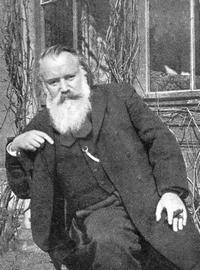The Well-Tempered Ear
Classical music Q&A: Science and music will meet again this Friday night in a FREE lecture-concert at the second SoundWaves program at the Wisconsin Institutes for Discovery.
3 Comments
By Jacob Stockinger
This Friday night, Oct. 25, at 7 p.m. in the Wisconsin Institutes for Discovery, this season’s second SoundWaves event will take place. It is FREE and OPEN TO THE PUBLIC.
The curator of the unusual program that combines science and music is University of Wisconsin-Madison horn professor Daniel Grabois. Besides teaching, he also performs in the Gretzler band with his colleague UW trombonist Mark Hetzler, the Meridian Arts Ensemble and the Wisconsin Brass Quintet.
For some background about the program and the first concert-lecture in September, which featured songs by Gustav Mahler, here is a link to a terrific interview with Grabois on the UW School of music blog “Fanfare”:
http://uwmadisonschoolofmusic.wordpress.com/2013/09/13/soundwaves9-26-2013/
Grabois (below) recently offered The Ear a Q&A about this week’s lecture-concert and about the program in general.
Here it is:
What is SoundWaves?
SoundWaves is a series I started last year. Each of our events takes on a theme, and explores it from various scientific angles (all aimed at the layman), then from a musical angle (I do that part), followed by a music performance relating to the theme.
The idea is for the public to learn about the world we live in, and to see how music fits in as well. Most of our presenters are UW faculty scientists and performers. At SoundWaves, they have an opportunity to share their knowledge in a non-technical way for people who are curious.
What kind of themes does SoundWaves tackle?
Our first event was called “Music to Our Ears.” We had a physicist talk about what sound is, a hearing expert talk about how the ear works, a neuroscientist discuss how the brain processes the ear’s signal, and a psychologist talk about how sounds affect our emotions.
We then performed the Horn Trio by Johannes Brahms (below), a patently emotional piece of music.
Doing that as our first event taught me that flow was really important: each lecture had to set up the next one. Other themes last year were Measurement, Tools, and Sequences. The theme of our October event is Groups and Their Behaviors.
Who is speaking and performing this Friday?
An entomologist will discuss bee communication. A mathematician will introduce us to group theory. A researcher from the Center for Complexity and Collective Computation (you have to love the UW!!!) will talk about his research regarding how groups of objects function in the physical world (through physics and chemistry), then what that tells us about group behavior in primates (including humans). And I’ll be talking about how musical groups function, specifically with regard to musicians’ body language.
After that, Linda Bartley (UW clarinetist, below top, in a photo by Katrin Talbot), Christopher Taylor (UW pianist, below bottom) and I will perform part of the Reinecke Trio for Clarinet, Horn (that’s me) and Piano. (A performance of Reinecke’s Trio on a YouTube video is at the bottom.)
Where is this project going?
Good question. I got a wonderful grant from the Chester Knapp Charitable Bequest to put on eight events this year, which I have to admit is a lot. But I’m having no trouble finding scientists to collaborate with, and I’m having a great time.
The biggest benefit for me is meeting all these great new people and learning lots of interesting stuff from them. Also, we’ve been having big audiences, and I love getting our School of Music faculty out of our building for performances in the Wisconsin Institutes for Discovery building (below, in a photo by Jeff Miller of the UW). WID is located at the corner of Orchard and University and is an amazing building).
What other themes will you be taking on this year?
Color, newness, rhythm, wood, repetition and metal.
How do you come up with themes?
I just sit down and think, “What do I want to know?” It’s pretty easy, since there’s so much I don’t know! And, here at UW, there’s a scientist available to answer just about any question you could think to ask.
For example, the instrument I play, the French horn (below), is made out of metal, but when push comes to shove, I have basically no idea what metal is, how it is manufactured, why making instruments out of it is a good idea, and so on. The music for the event on metal is planned already, and when I am ready to start lining up scientists, I’ll head straight to the Materials Science department, then Chemistry, maybe Engineering, and so on.
Once the theme is chosen, my questions about the theme lead me straight to the right science people. And I have to tip my cap to Laura Heisler (the program director at WID), who knows tons of scientists and has put me in touch with many brilliant people.
Is the science hard to understand?
NO!!! Our basic ground rules are: no jargon, no technical stuff unless it’s absolutely necessary. Last year, a chemist explained what DNA really is, and I think we all got it!
Where can people get more information?
Go to http://www.warf.org/home/news-media/campus-programs/soundwaves/soundwaves.cmsx for a list of our events. They all start at 7 p.m. Everything is FREE and OPEN TO THE PUBLIC. In the WID building, right in the middle of the giant ground floor is a big round space called the DeLuca Forum (below), where we have our events.
Why should people come?
The UW-Madison has brilliant scientists and musicians. Come hear what they have to say and play, and learn about our world.
Tags: bees, chemistry, Christopher Taylor, clarinet, engineering, Friday, group theory, Horn, Horn Trio, Jacob Stockinger, Johannes Brahms, Mark Hetzler, Materials Science, Meridian Arts Ensemble, science, SoundWaves, University of Wisconsin–Madison, UW School of Music, Wisconsin, Wisconsin Brass Quintet, Wisconsin Institutes, Wisconsin Institutes for Discovery, YouTube






